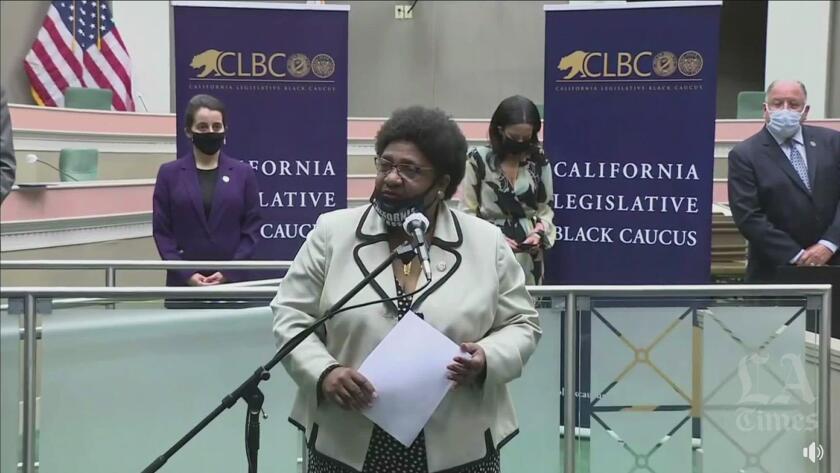California’s black lawmakers urge support for bills to address systemic inequality
- Share via
Assemblywoman Shirley Weber: “This pandemic of hate has spread across the nation to every small city in America.”
- Share via
SACRAMENTO — As protests over the death of George Floyd continued across the state, black lawmakers gathered Tuesday at the state Capitol to urge the passage of legislation that would address affirmative action, voting rights and begin a process to consider reparations in California for the institution of slavery.
Leaders of the California Legislative Black Caucus described a century-long battle in Sacramento to correct injustice and issued a call for others to join them during an at times emotional news conference.
“While we fight for the solution, we know that the solution lies in the changing of this nation and for those who don’t look like us to, for once, take the banner up and fight the battle that is so essential,” said Assemblywoman Shirley Weber (D-San Diego), who leads the caucus. “We have fought it. We have given our lives. We have given all that we have. We have given the moral conscience to this nation about what is right and what is just, and at the same time as we do all of that, we still find ourselves the last one in the door.”
The lawmakers reflected on the events in Minneapolis that triggered nationwide protests over the last week and warned that without change, the U.S. will soon find itself once again mourning the death of an African American in police custody. Just last year, the caucus helped enact Assembly Bill 392, a landmark law to curb the use of deadly force that was inspired in part by protests in Sacramento over a decision to not charge the police officers who shot and killed Stephon Clark, an unarmed black man, in 2018.
“In the words of Fannie Lou Hamer: We’re sick and tired of being sick and tired,” state Sen. Steven Bradford (D-Gardena) said. “We have seen, night after night, the protests throughout this state and this nation by people who are sick and tired of the status quo. We’re sick and tired of seeing unarmed black men and women killed by police. We’re sick and tired of seeing these officers not being held accountable for their actions.”
Among legislation the caucus is prioritizing this year is ACA 5, a closely watched proposal that would begin a process to repeal Proposition 209. The 1996 ballot measure prohibited discrimination or preferential treatment by public institutions on the basis of race, sex, color, ethnicity, or national origin in employment, education or contracting.
Opponents of the original ban on affirmative action in California point to data on gender and ethnic disparity in civil service, lower representations of African Americans and Latinos in public universities and similar inequities in state contracts. If passed by the Legislature, ACA 5 would ask voters to repeal the law.
Another constitutional amendment and top issue of the caucus, ACA 6, would restore voting rights to felons serving parole. California law prohibits felons from voting during their parole but allows them to cast ballots if they are on probation. Supporters of the bill argue that many people don’t know the difference between probation and parole, resulting in eligible voters who do not register out of fear of breaking the law.
Assemblyman Kevin McCarty (D-Sacramento), who brought back ACA 6 this year after it failed to pass in 2019, said existing law disproportionately affects black voters.
“This is a relic of Jim Crow laws,” McCarty said at the news conference Tuesday. “And it’s time to get rid of this policy as many states [in the country] have already done so.”
The caucus also highlighted AB 3121 as a key proposal. The bill would create an eight-member task force to study the impacts of slavery in California and develop proposals for potential reparations.
Also introduced by Weber, the bill gives the Senate and Assembly three appointees each and asks the governor to fill two slots, ultimately selecting a bipartisan mix of lawmakers and representatives of major civil society and reparations organizations to serve. Among the group’s duties would be to recommend a form of compensation and who would be eligible.
“The issue we face for over 400 years is the enslavement, the mistreatment and often the efforts of genocide of the African in this country,” Weber said Tuesday. “That is a fact of life.”
Other proposals supported by the California Legislative Black Caucus:
— SB 144, from Sen. Holly Mitchell (D-Los Angeles), ends the collection of many administrative fees imposed against people in the criminal justice system.
— AB 1460, from Weber, would make the completion of a three-unit ethnic studies course an undergraduate requirement in the California State University system beginning with graduates in the 2024-25 academic year.
— AB 1835, from Weber, seeks to prevent local education agencies or charter schools from using unspent state education dollars intended to increase and improve services for low-income students for other purposes in a subsequent school year.
— AB 1950, from Assemblywoman Sydney Kamlager-Dove (D-Los Angeles), limits probation to a maximum of one year for misdemeanor offenses and two years for felony offenses.
— AB 1994, from Assemblyman Chris Holden (D-Pasadena), expands access to health-care services to juveniles upon release from a public institution.
— AB 2019, from Holden, increases access to community college courses for students in juvenile court schools and alternative schools.
— AB 2054, from Kamlager, creates a grant pilot program to improve emergency response services for vulnerable populations.
— AB 2405, from Assemblywoman Autumn Burke (D-Marina del Rey), establishes a right to housing for children and families in California effective Jan. 1, 2026.
More to Read
Sign up for Essential California
The most important California stories and recommendations in your inbox every morning.
You may occasionally receive promotional content from the Los Angeles Times.












